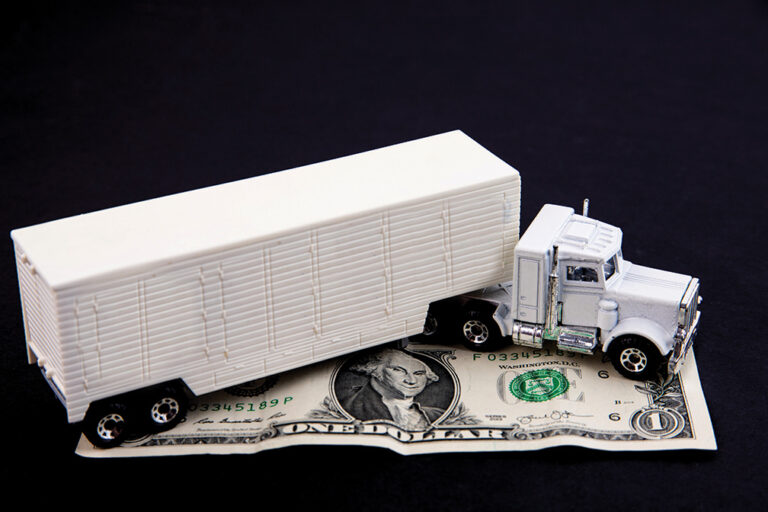Consumer spending affects every aspect of the economy. In the trucking industry, it can mean the difference between lots of loads to carry or hardly any at all.
Consumer spending is also the largest driver of economic growth. Federal Reserve data indicates that consumers account for about 69% of the gross domestic product.
If consumer spending shifts too far toward services from goods, some experts in the trucking world are concerned that it could affect the industry’s bottom line in 2022. But others aren’t worried at all.
FTR Transport Intelligence’s Vice President of Trucking Avery Vise said watching where consumer spending is heading now after getting past a period of “previously unfathomable government stimulus … is enormously important, as consumer goods make up the lion’s share of what truckload carriers haul.”
Vise added, “This is not an issue today — consumer spending remains very healthy — but it’s a big risk factor for 2022, and perhaps even the rest of this year. Current levels of spending just aren’t sustainable, and to some degree past spending depresses the demand for future spending.”
For now, consumer spending remains relatively healthy in both the goods and services sectors.
On October 1, the Commerce Department announced that consumer spending rebounded 0.8% (an increase of $130.5 billion) in August. Consumer spending grew at a 12% annualized rate in the second quarter, accounting for much of the economy’s 6.7% growth pace, which raised the level of gross domestic product above its peak in the fourth quarter of 2019.
Growth estimates for the third quarter are below a 5% rate.
Economists say this slight uptick was likely due to back-to-school shopping and child tax credit payments from the federal government. Additionally, consumers currently have more buying power and are feeling more confident now that vaccines have rolled out for COVID-19.
The Commerce Department said in an October 1 news release the increase in personal income in August primarily reflected increases in compensation of employees and government social benefits.
“Within compensation, the increase primarily reflected an increase in private wages and salaries,” stated the news release. “Within government social benefits, an increase in ‘other’ social benefits, reflecting advance child tax credit payments authorized by the American Rescue Plan, was partly offset by a decrease in unemployment insurance, reflecting decreases in payments from the Pandemic Unemployment Compensation program.”
The $130.5 billion increase in the current Personal Consumption Expenditures Price Index in August reflected an increase of $66 billion in spending for goods and a $64.6 billion increase in spending for services, according to the Commerce Department.
Within goods, increases in spending for food and beverages, as well as “other” nondurable goods — primarily household supplies and recreational items — were partly offset by a decrease in spending for motor vehicles and parts.
Within services, the increases were widespread, led by “other” services, including personal care and clothing services, housing, and utilities, and health care.
Economist Bill Conerly said that consumers have more capacity to spend than businesses have capacity to deliver goods and services.
“Aggregate consumer spending will certainly be higher in 2022, but not to the degree that consumers would like,” said Conerly. “Prices are likely to rise, and when the price tags are not actually changed, look for an absence of discounts and promotional sales.”
With COVID-19 infections trending downward in many areas, a rise in demand for travel and other services will result in a slight shift from goods spending to service spending, economists predict. But that isn’t necessarily bad news, said Broughton Capital Founder Donald Broughton.
If anything, he said, he’s excited about a “bullish future.”
“I am more bullish about the economy than I have ever been in my entire life,” he shared, comparing the current situation to that of the end of World War I and the Spanish influenza.
As COVID-19 begins to wane, he said, people are spending more and more.
For tangible proof behind his prediction, Broughton pointed to the number of cargo ships currently under contract to be built. There are 220.
Additionally, he said, new technology is continuing to be developed and streamlined into consumers’ homes, giving them even more reasons to buy goods.
“Two to three years from now, these ships will all be fully loaded, and even more will need to be built,” said Broughton. “And, of course, there will be a need for more trucks and drivers to deliver those goods as well.”
As for the dozens of ships that are backlogged from docking on the U.S. Pacific coast, he labeled the situation “a good problem,” because it means people are buying more and more things.
“After you survive a disaster … you celebrate because you made it out,” he added. “You got through it. It’s the way human beings live. Everyone is poised to go back to work. Of course, there will be fits and starts. But we have more talented people and more technology than ever before. They will fix it.”
Linda Garner-Bunch has been with The Trucker since 2020, picking up the reins as managing editor in 2022. Linda has nearly 40 years of experience in the publishing industry, covering topics from the trucking and automotive industry to employment, real estate, home decor, crafts, cooking, weddings, high school sports — you name it, she’s written about it. She is also an experienced photographer, designer and copy editor who has a heartfelt love for the trucking industry, from the driver’s seat to the C-suite.











